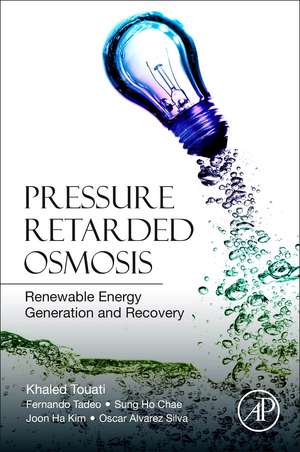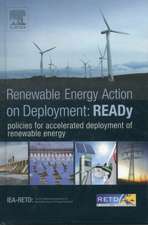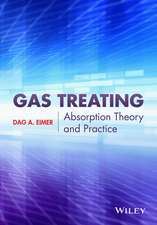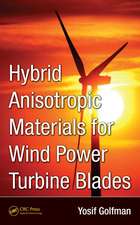Pressure Retarded Osmosis: Renewable Energy Generation and Recovery
Editat de Khaled Touati, Fernando Tadeo, Joon Ha Kim, Oscar Andres Alvarez Silva, Sung Ho Chaeen Limba Engleză Paperback – 18 mai 2017
The promises of the PRO technique are first clearly presented and explained, and the authors then provide a comprehensive analysis of the issues that remain such as Concentration Polarization, Membrane Deformation, and Reverse Salt Diffusion. Possible solutions to these issues which often restrict industrial implementation are then discussed to mitigate these detrimental effects, and there is also an emphasis on the recovery of energy from desalination processes using PRO, which is able to reduce energy consumption and make it more economically and environmentally efficient.
- Combines research with experience to deliver a complete resource on Pressure Retarded Osmosis
- Discusses all areas of PRO in detail
- Offers solutions to problems commonly experienced and summarizes each method with a clear and concise conclusion
- Includes case studies from the Great Salt Lake (U.S.A) and Dead Sea (Asia), as well as other rivers from America, Europe, and Asia
Preț: 693.60 lei
Preț vechi: 904.10 lei
-23% Nou
Puncte Express: 1040
Preț estimativ în valută:
132.76€ • 144.26$ • 111.59£
132.76€ • 144.26$ • 111.59£
Carte tipărită la comandă
Livrare economică 14-28 aprilie
Preluare comenzi: 021 569.72.76
Specificații
ISBN-13: 9780128121030
ISBN-10: 0128121033
Pagini: 188
Dimensiuni: 152 x 229 x 17 mm
Greutate: 0.79 kg
Editura: ELSEVIER SCIENCE
ISBN-10: 0128121033
Pagini: 188
Dimensiuni: 152 x 229 x 17 mm
Greutate: 0.79 kg
Editura: ELSEVIER SCIENCE
Public țintă
Researchers working in renewable energies, membranes, water treatment, desalination. Membrane manufacturers, Postgrad students in Energy, Chemical Engineering and Environmental Engineering. Professors in membrane processes and Renewable EnergyCuprins
1. Pressure Retarded Osmosis as a Renewable Energy Source
2. Water and salt fluxes in Pressure Retarded Osmosis
3. Effects of the temperatures in PRO
4. Integration of PRO in desalination processes
5. Implementing salinity gradient energy at river mouths
2. Water and salt fluxes in Pressure Retarded Osmosis
3. Effects of the temperatures in PRO
4. Integration of PRO in desalination processes
5. Implementing salinity gradient energy at river mouths











